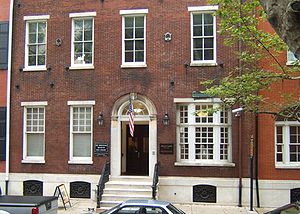The Rosenbach Library & Museum of Philadelphia, and the Philadelphia Free Library have announced plans to merge. The press release notes that bridge funding for the merger (the details of which have not been announced) has been provided in part by the Pew Charitable Trust.
| Rosenbach Museum and Library 2008-2010 Delancey Place Philadelphia, PA 19103 Home of Dr. A.S.W. Rosenbach (1876-1952) and his brother Philip, book dealers and collectors The Maurice Sendak Building, ca. 1860 Townhouse (Photo credit: Wikipedia) |
Although this is described as a merger, when a larger organization takes over management of a small organization, it’s more often a take over. I don’t details and I can only speculate, but I believe that the merger will be good for researchers and staff as well as collections. It makes a lot of sense for smaller institutions to seek the aid of larger ones, and the merged institution can achieve economies that would be impossible for an independent Rosenbach. The Rosenbach was the private collection of the legendary pair of early 20th C book and manuscript dealers, the Rosenbach brothers. The Rosenbach, in addition to its extraordinary manuscript collection and holdings such as Joyces’s Ulysses, has more recently been the recipient of many of Maurice Sendak’s illustrations and manuscripts.
A minor point is the support from the Pew Charitable Trust. Word on the street is that foundations like the Pew have been encouraging small organizations like small historical societies and museums to join with larger organizations. I think the underlying thinking is to encourage greater economies, discourage competition for scarce money (such as grants), and to create larger, healthier institutions. In my own non-profit work, I have sometimes been told by foundations that we need to review our business model–how a non-profit gets money for its activities and operations-to ensure that we fulfill our mission. Foundations like Pew often have the bigger picture that small institutions don’t have, and they’ve been using their perspective and influence to shape the field of research institutions as they can. It will be interesting to see how other small institutions survive in a time of reduced giving.
UPDATE 4/21/2013: The Philadelphia Inquirer ran a story by Peter Dobrin about the merger and noted that “Money is ultimately driving the merger. Though the Rosenbach laid off much of its staff in June after being hit with a deficit, no immediate crisis exists, leaders say. …. But operating grants are harder to land, and by living within its means the library and museum is not realizing its potential…. The Rosenbach’s budget requires that 75 percent of income be raised annually; the other 25 percent is from admission and membership fees, endowment income, and shop revenue.” The story notes that no employees will be laid off, and it’s uncertain whether the Rosenbach board will remain separate. Open issues: “whether the Rosenbach would maintain a separate corporate structure; whether the Free Library Foundation would absorb its endowment; issues relating to donors; whether two boards would be kept, and, if so, what their responsibilities would be.” Also note that the Free Library is considering deaccessioning. (hat tip to Jeremy Dibbell at Philobiblos.)

